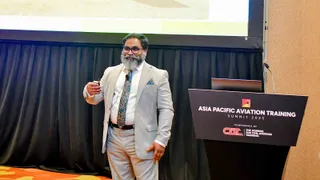A New Approach to Funding and Type Rating Training
Contact Our Team
For more information about how Halldale can add value to your marketing and promotional campaigns or to discuss event exhibitor and sponsorship opportunities, contact our team to find out more
The Americas -
holly.foster@halldale.com
Rest of World -
jeremy@halldale.com

Chris Long reports on training provider CTC Aviation’s operations.
There is no reason to doubt the Boeing forecasts which predict demand for a very large number of pilots over the next 20 years. There will always be challenges to pilot training - getting the numbers of new entries is itself a huge task, but beyond that, probably the major issue that remains is the cost of effective training. Additionally, as the number of airlines increases, the one-size-fits-all template for a type rating is not necessarily the most efficient solution. CTC Aviation has put in place processes which it believes addresses both of those challenges.
Over more than 20 years CTC Aviation has established itself as a highly credible training provider. Initially primarily concerned with the provision of type rating training services for airlines and subsequently grooming newly-qualified pilots to progress to full commercial airline operations. The range of training now spans the entire career of an airline pilot including selection and resourcing services, from ab initio, though type rating and on to recurrent, command, instructor and examiner qualifications for both individuals and airline employees. Throughout this evolution there has been a culture of enthusiastic innovation to adapt to the realities of training demand, and at least two aspects deserve particular attention.
Ab Initio - A Solution for AirlinesThe vexed question of accessing funding has frequently been a bar to new entrants, and, at a time when the demand is strong, many young people have simply not been able to finance their own training. Fully airline-sponsored training is rarely seen outside the Gulf region and Asia, but there are now schemes whereby risk and cost can be shared between student pilots, the airline and the training provider.
CTC Aviation has been in the vanguard of new ideas for such funding, and now has robust schemes in place. Whether the training is the CPL/IR Frozen ATPL, or a MPL course, CTC Aviation has worked with airlines to customise a package, and takes the lead in the cooperation between trainee, airline, regulator and banks.
Anthony Petteford, Chief Commercial Officer, cites the example of the present programme to provide new pilots for easyJet, the UK’s largest LCC. This is a process that envelopes goals which fit well to the new mindset and career pattern. The process starts with a selection held in the original base of CTC Aviation, Dibden Manor, Southampton UK, where a specialist CTC Aviation assessor and recruiters from easyJet give a one day assessment for candidates. Those selected for training then complete a CTC Aviation instructor-led and iPad-supported MPL theory course either in the UK or at Hamilton, New Zealand, one of two overseas bases.
This is followed by single engine flight training either in Hamilton or at Phoenix, Arizona (the second overseas base) using EFIS Cessna C172 or Diamond D40 aircraft. Multi engine training is carried out back in the UK on the A320 devices using easyJet’s Standard Operating Procedures (SOPs). Prior to flying with the airline this part of the training is completed on the A320 full flight simulator and A320 aircraft, thereby achieving the formal Type Rating. Line Oriented Experience (LOE) and Line Check is carried out with easyJet.
Key FeaturesThe entire training package to completion of the Line Check is scheduled to last for 78 weeks. Once the trainee is selected and has embarked on the process, the fees are fixed, and CTC Aviation provides ‘Performance Protection’ against the cost of any additional training should it be necessary, and a refund of monies if CTC Aviation ceases the training because of performance falling below the required standard. Critically, CTC Aviation can provide help with securing a bank loan against the future job with easyJet, and this opens the door to those without the cash-in-hand.
There is also the option of starting a BSc (Honours) Degree in Professional Aviation Pilot Practice accredited by Middlesex University London, by way of preparing for a long-term career in aviation.
Whilst this model is used by easyJet, other airlines follow a similar profile but, for instance with British Airways, the training is to the issue of the conventional CPL/IR Frozen ATPL and BA will underwrite loan financing if required.
Statistics are now building up as to the success of this pattern. Mike Redrupp, Chief Operating Officer – Airline Training, quotes a failure rate of 0.9%, which improved in 2013 to 0.5% - pretty impressive, and that brings much more effective course planning and scheduling. He emphasises that it is essential to work closely with the parties involved - in particular the shaping of a MPL course is a team game, with inputs from CTC Aviation, the regulator and the airline. A strong feedback loop means that any lessons learnt about training effectiveness can rapidly be fed back into the system.
Additional Strands of TrainingWhilst the training can start with either ab initio MPL or CPL/IR, the career-long training support can continue with all the elements a professional pilot might need; each tailor-made to the individual or airline requirement.
Petteford reiterates that CTC Aviation is not shy about embracing new training opportunities, and full cabin crew training is also now available. There is ongoing and considerable investment in new equipment to support both flight crew and cabin crew training. Having established this solid foundation, Petteford sees the larger strategy as developing the footprint both geographically and in the range of training opportunities (see CAT 4/2014). In the immediate future, organic growth is the way forward, although there may well be opportunities for further partnerships.


